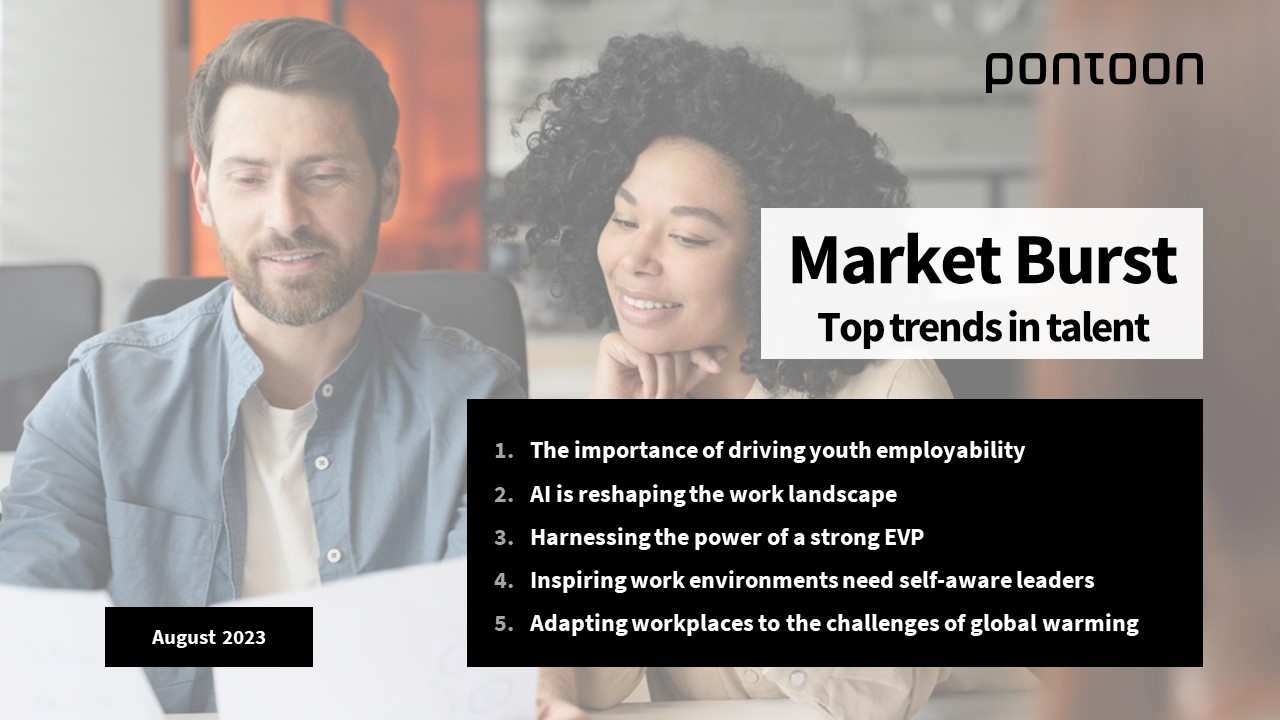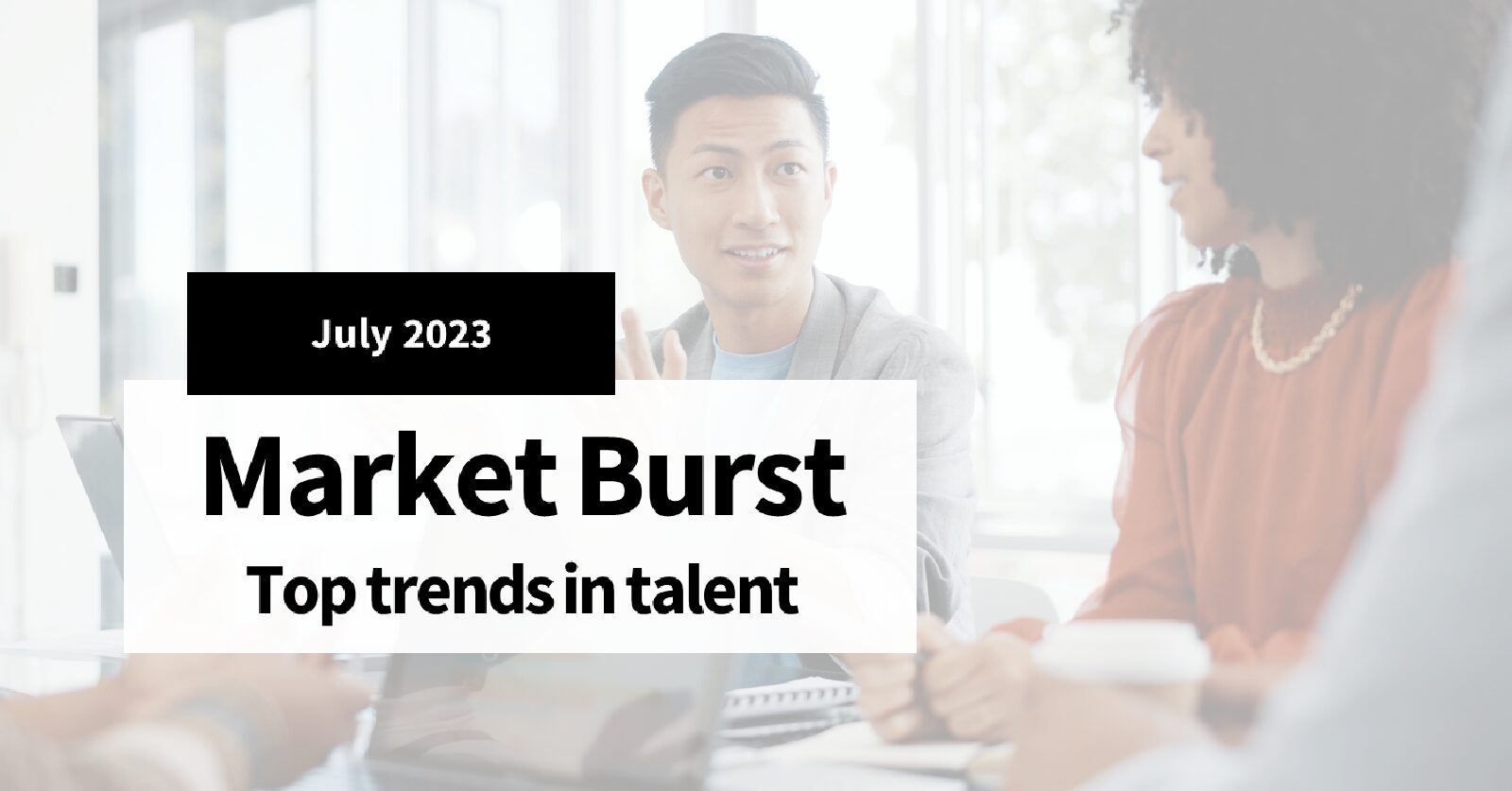Market Burst: August 2023
Read about top trends in the world of work.
In this month’s instalment of our Market Burst, we dive into the trends that continue to drive talent management in the evolving workspace. These include the importance of driving youth employability, harnessing the power of a strong EVP, adapting workplaces to the challenges of global warming, and more.
The importance of driving youth employability
With talent shortages prevailing across industries, it’s never been more critical to drive the employability of a diverse range of candidates, including the employable youth. While programmes focused on enhancing young people’s career prospects can take many shapes and forms – for example, career coaching, vocational training, or access to work experiences – all of them help activate the youth’s potential while building a future-ready workforce.
Meanwhile, some worrying data on youth unemployment hit the news recently. The jobless rate for people aged between 16 and 24 in China reached 20.8% in May, with the fundamental causes of this dire situation including a mismatch between university education vs the roles available in the job market. In fact, some European Union countries have it even worse, with Spain reporting a staggering 28.4 % unemployment rate for people younger than 25 years.
Enhancing youth employability has numerous benefits for individual organisations and the broader economy. It can help solve pockets of the current talent gap and prevent future skills shortages by developing young individuals’ long-term career prospects. In addition, driving youth employability encourages entrepreneurship and fosters a culture of innovation, which strengthens overall economic growth. It also contributes to a more diverse and inclusive workforce, benefiting organisations and societies through fresh perspectives, creativity, and a broader range of talents.
“I think engaging people at a much younger age is crucial. This is the foundation of all our programmes – including Creating Brighter Futures. We start at 11 years old, because there are plenty of studies showing that intellectual confidence develops between 11 and 13, and that’s when you figure out what you are good at.”
Sandhya Sabapathy (Adecco UK&I) in conversation with Freddy Otto (Pontoon Instinct)
For a full version of Sandhya and Freddy’s interview, please follow along here.
AI is reshaping the work landscape
Leadership at many companies realise the potential of artificial intelligence to boost their workers’ productivity. Despite prevailing concerns about the tech’s potential to reduce the need for a human workforce, 64% of C-suite say they will hire more professionals of all types due to generative AI. Rather than replacing humans, artificial intelligence is expected to transform our work by automating parts of specific tasks.
Also, the current tech revolution will likely create new jobs connected with operating AI, such as AI strategists, developers, writers, and more. Unsurprisingly, AI and big data are firms’ third biggest upskilling/ reskilling priority for the next five years (2023–2027).
Meanwhile, some countries globally lead the effort to regulate the use of AI. Stanford University report shows that 37 AI-related bills were passed into law in 2022. This year is no different, with notable recent examples including the EU or US regulations. Read more in our latest Regulatory Update.
Considering the recently enacted AI policies, it becomes imperative for organisations to familiarise themselves with optimal and compliant methods of integrating artificial intelligence into everyday operations, including in talent attraction. It’s essential to find a harmonious balance between using the advantages of AI and deploying it ethically.
Harnessing the power of a strong EVP
A strong Employer Value Proposition (EVP) is essential for attracting and retaining top talent in today’s competitive job market. The latest data shows that higher job satisfaction increases the odds of a person staying in a job by more than 126%. If we want to build thriving and agile organisations that foster long-term employee engagement, creating EVPs that resonate with the modern workforce’s values and expectations is crucial.
Some of the vital steps necessary to create an effective EVP are:
- Understanding the unique needs and factors that motivate and engage workers.
- Emphasising the firm’s commitment to workers and the benefits they can expect.
- Focusing on balancing material offerings with opportunities for growth, connection, and meaning.
The key benefits of having a compelling EVP include:
- Attracting top talent and fostering a culture of innovation and agility.
- Retaining employees by addressing their personal and professional needs.
- Nurturing a loyal, engaged, and productive workforce that is well-equipped to adapt to the rapidly changing business landscape.
Inspiring work environments need self-aware leaders
The latest McKinsey report mentions the need for self-aware leadership as one of the critical shifts that shape organisations across industries. Managers must work on a thorough understanding of themselves and their operating environments to reflect on their behaviours and better connect with their workforce. So far, only 25% of global executives say their organisation’s leaders are engaged and inspire workers to grow and be at their best.
Motivation and self-awareness are some of the most sought-after skills in 2023, mentioned by 50% of companies. Interestingly, it’s preceded and followed by other self-efficacy competencies, such as resilience, flexibility and agility (51%), as well as curiosity and lifelong learning (46%). These types of skills are expected to grow in importance in the next five years, with nearly 6 in 10 organisations projecting the importance of motivation and self-awareness to increase.
Leaders who choose to raise their self-awareness bring significant improvements to their businesses, including:
- Better decision-making: self-conscious managers identify and regulate biases better and prevent emotions from compromising their choices.
- More effective communication: they listen, understand, empathise, and respond better.
- Stronger relationships: self-aware executives demonstrate authenticity that draws workers and other stakeholders to their vision.
- Positive work environments: they foster an atmosphere that encourages diverse workers to play to their strengths.
Adapting workplaces to the challenges of global warming
The consequences of continuous global warming have been impacting humans for a few years now, and there seems to be no end in sight. On the contrary, recent reports show a 98% likelihood that the next five-year period will be the warmest on record. Workplaces are not immune to the impacts of climate change, and employers need to adjust their sites and premises to these unfavourable conditions. Otherwise, they risk substantial productivity losses caused by heat stress, reduced work capacity, diminished cognitive abilities, mental fatigue, and more.
According to International Labour Organisation (ILO), in 2030, 2.2% of total working hours worldwide will be lost to high temperatures – a productivity loss equivalent to 80 million full-time jobs. Positions in all sectors are affected, however, workers in agriculture, transportation, natural resources management, and industrials bear the heaviest burden. Experts at the Institution of Mechanical Engineers (IMechE) stress that organisations must work together with policymakers and academia to prepare and adapt accordingly. Some of the actions can include:
- Implementing adaptation plans for people, buildings, equipment, and plants.
- Designing approaches to upgrade buildings and assets to ensure that they are fit for a hotter world.
- Ensuring that climate change knowledge is embedded in all curricula to enable individuals from various fields to work on solutions for sustainable net-zero design, circular economy, and climate change resilience.
“How do you align and protect yourself as an organisation against global warming? It impacts human capital massively because you need to look at health and safety and how you protect your people. We always think about protecting the goods and making the company run, but this includes people.”
Antoine Poincare (AXA Climate School) in conversation with Freddy Otto (Pontoon Instinct)
For a full version of Antoine and Freddy’s interview, please follow along here.
Related Post
Read about top trends in the world of work.
In this month’s instalment of our Market Burst, we dive into the trends that continue to drive talent management in the evolving ...





